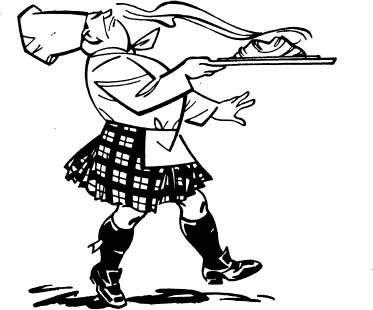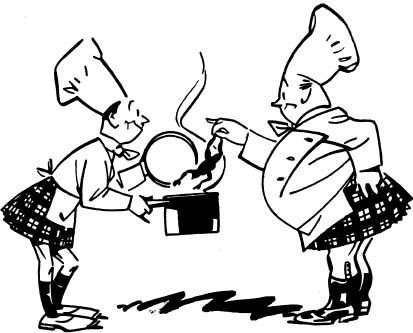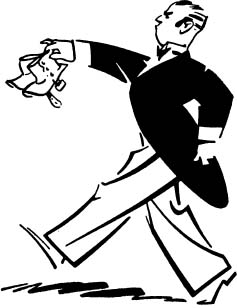

WELL, BOYS, TO-NIGHT’S the night. St. Andrew’s Day has come once again, and all over the world, from London to the remotest British colony, Scotsmen will soon be seated about dinner tables—waiting. They will have gathered together to do honour to their patron saint, but it will not be of him that they will be thinking at the moment. Their knives and forks clutched in their hands, their mouths watering, their eyes wolfish, they will be watching the door through which are about to enter, in the following order, bagpiper, the bearers of Atholl brose, and . . . the Haggis.
Incredible as it may seem, they will be looking forward to eating the beastly stuff. Yet do not think that I blame the honest fellows. I am broadminded. The fact that I, personally, have a stomach which shies like a startled horse and turns three handsprings at the mere thought of haggis, does not lead me to sneer at their simple enthusiasm. What I say to myself is that there must always be Dangerous Trades, that it takes all sorts to do the world’s work, and that if these devoted men are willing to eat haggis, it ill becomes us to raise our eyebrows. A hearty, “Well, best of luck,” seems to me a more proper attitude.
It is never any use getting worked up about other people’s food. You may not be able to understand why a cannibal chief, with all the advantages of an education at Balliol, should like to tuck into the fried missionary, but he does. The thing simply has to be accepted, just as we accept the fact that Americans enjoy Chicago potted-meat and Frenchmen bouillabaisse. In bouillabaisse you are likely to find almost anything, from a nautical gentleman’s sea-boots to a small China mug engraved with the legend “Un cadeau (a present) de (from) Deauville (Deauville)”, while Chicago potted-meat. . . . Well, we have all read Upton Sinclair’s The Jungle, and are familiar with the poignant little story of the emotional packer named Young who once, when his nerves were unstrung, put his wife Josephine into the chopping machine and canned her and labelled her “Tongue.”
Nevertheless, Frenchmen do go for this bouillabaisse in a big way, and so do Americans for potted-meat. It is the same with Scotsmen and haggis. They like it. It is no good trying any appeals to reason. I tell you they like it.

The fact that I am not a haggis addict is probably due to my having read Shakespeare. It is the same with many Englishmen. There is no doubt that Shakespeare has rather put us off the stuff. We come across that bit in Macbeth in our formative years and it establishes a complex.
You remember the passage to which I refer? Macbeth happens upon the three witches while they are preparing the evening meal. They are dropping things into the cauldron and chanting “Eye of newt and toe of frog, wool of bat and tongue of dog,” and so on, and he immediately recognises the recipe. “How now, you secret, black and midnight haggis,” he cries shuddering.
This has caused misunderstandings, and has done an injustice to haggis. Grim as it is, it is not as bad as that—or should not be. What the dish really consists of—or should consist of—is the more intimate parts of a sheep, chopped up fine and blended with salt, pepper, nutmeg, onions, oatmeal, and beef suet. But it seems to me that there is a grave danger of the cook going all whimsy and deciding not to stop there. When you reflect that the haggis is served up with a sort of mackintosh round it, concealing its contents, you will readily see that the temptation to play a practical joke on the boys must be almost irresistible.
Scotsmen have their merry moods, like all of us, and the thought must occasionally cross the cook’s mind that it would be no end of a lark to shove in a lot of newts and frogs and bats and dogs and then stand in the doorway watching the poor simps wade into them.

Nor could the imposture be easily detected. That Athol brose, to which I have referred above as the junior partner of haggis, is a beverage composed of equal parts of whisky, cream, and honey. After a glass or two of this, you simply don’t notice anything, not even if you are at the table or under it.
I must confess that if I were invited to a St. Andrew’s night, I would insist on taking Sir Bernard Spilsbury with me, and turning my plate over to him before I touched a mouthful.
My caution might cast a damper on the party. Unpleasant looks might be directed at me. I would not care. “Just analyse this, Bernard,” I would say, quietly, but firmly. And only when he had blown the All Clear would I consent to join the revels.
Haggis has another quality which I dislike. I asked a Scottish friend how you started in on it—what was the first move, as it were—and a dreamy, soulful look came into his face.
“You give it a big cut with your knife,” he said, “and it smiles at you.” I deprecate this. Heaven knows I am no snob, but there are social distinctions. A decent humility is what we expect in our food, not heartiness and familiarity. A haggis should know its place like a chop. Who ever saw a simpering chop?
An odd thing—ironical, you might say—in connection with haggis is that it is not Scottish. In an old cook book, published 1653, it is specifically mentioned as an English dish called haggas or haggus, while France claims it as her mince (hachis) going about under an alias. It would be rather amusing if it turned out one day that Burns was really a couple of Irish boys named Pat and Mike.
“Jeeves,” I said, “those spats.”
“Yes, sir?”
“You really dislike them?”
“Intensely, sir.”
“You don’t think time might induce you to change your views?”
“No, sir.”
“All right, then. Very well. Say no more. You may burn them.”
“Thank you very much. I have already done so. Before breakfast this morning. A quiet grey is far more suitable, sir. Thank you, sir.”

To the
Immortal Memory
of
John Henrie and Pat Rogie
who
at Edinburgh, in the year A.D. 1593
were imprisoned for
“Playing of the gowff on the links of
Leith every Sabbath the time of the sermonses,”
also of
Robert Robertson
who got it in the neck in A.D. 1604 for the same reason.
Author’s Dedication, “Clicking of Cuthbert.”